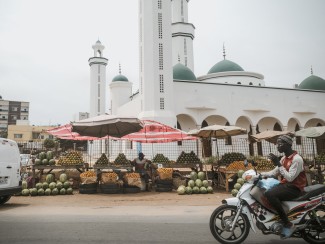New project focusing on selected value chains from seaweed to honey
The vast majority of those farming seaweed on the shores of Zanzibar are women. It is difficult labor that involves long hours in the water and heavy burdens. And, as water temperatures rise, people are forced to work farther and farther from land.
The occupation has offered an economic benefit to many women and youth in Tanzania, who have been able to support their households with the income generated from selling their products to the market. With the seaweed industry a global business, a new partnership between the Enhanced Integrated Framework (EIF) and the United Nations Development Programme (UNDP) is targeting this sector, along with four other agri-business value chains in the country, that can bring a host of benefits to women and youth through trade development.
Here’s how.
1) Analyzing markets
With the goal to boost incomes and the national economy, five selected value chains were identified from recent analysis that could have the biggest impact on the livelihoods of the country's rural population, focusing specifically on women and youth. These include honey, palm products, horticulture, seaweed and anchovies.
“Instead of starting with production and searching for a market, we decided to start from the markets,” said Emmanuel Nnko, Head of Inclusive Growth Pillar at UNDP, which is implementing the project.
More accessible and competitive markets at domestic, regional and international level can serve to alleviate poverty, as well as having a host of wider benefits for sustainable economic growth. Well-functioning markets stimulate investment and encourage small businesses to innovate, reduce costs, and create employment.
Looking at demand in the Middle East, Asia and Europe, as well as what was happening with regional markets, analysis uncovered what Tanzania could offer. Baseline surveys were completed for the sectors, and a plan put in place to set out how the project could best support those working in them.
2) Building on previous work
As a least developed country, the Government of Tanzania has partnered with EIF for more than a decade as the country strives to boost its trade. This includes a series of studies of the trade environment, most recently a diagnosis in 2017 that zeroed in on Tanzania’s agribusiness and tourism potential. As well as this, EIF has worked with the Swiss Government and multiple partners from across the UN system on a UN Trade Cluster project which supported Tanzania in linking agri-business sectors and tourism.
UNDP has also recently concluded work that focused on horticulture in the country.
“Why horticulture? Horticulture is the fastest growing subsector within the Tanzanian agricultural sector, with an annual average growth of around 11 per cent. This growth is more than double the overall growth rate of the agriculture sector. The subsector is also a major employer in Tanzania, providing jobs for around 4.4 million people, 400,000 of which are women" said Nnko.
The earlier UNDP project addressed issues from productivity , to enabling the business environment, to technological advancement and market access to financing. Extension officers helped women increase productivity through the use of drip irrigation and monitoring soil health. The new EIF and UNDP partnership in Tanzania will draw on UNDP’s experience supporting women and Youth horticulturalists, and the specifics of getting products to established markets.
3) Addressing institutions
Providing technical assistance is a necessary element of the work. This includes getting the right research into the hands of those in government, including the Ministry of Industry and Trade. The project is developing an ecommerce framework and strategy for Tanzania, as the country lays the foundations for a digital economy.
“We need to have a kind of framework that will guide these undertakings around digital economy services,” said Nnko. “But we also expect that the sales and exports of MSMEs will be increased, and that requires improving the trade and investment environments, for example putting in place friendly policies and regulatory frameworks, which ultimately will help trade and investment flourish.”
4) Leveraging resources
A collection of resources from different institutions is going to this work, including US$2.1 million from EIF, an in-kind contribution of USD240,000 from the Ministry of Industry and Trade and USD500,000 from UNDP. It is hoped that additional resources to support small businesses comes in as these efforts progress.
5) Focusing on free trade in Africa
Tanzania is expected to ratify the African Continental Free Trade Agreement (AfCFTA) later this year, and the partnership is developing an analysis to address how the country can best position itself amid this new opportunity. The study undertaken will focus on in-depth cost-benefits analysis of the AfCFTA and the market access opportunities for Tanzania.
“The document will support and inform the government here, looking at the benefits the AfCFTA can bring and potential new markets,” said Nnko.
In combination with institutional coordination and the kind of targeted support being offered by EIF and UNDP, according to Nnko a “360 degree kind of intervention”, Tanzania continues to move into position for smoother local, regional and international trade.
If you would like to reuse any material published here, please let us know by sending an email to EIF Communications: eifcommunications@wto.org.

